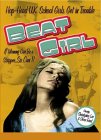| Reviews & Columns |
|
Reviews DVD TV on DVD Blu-ray 4K UHD International DVDs In Theaters Reviews by Studio Video Games Features Collector Series DVDs Easter Egg Database Interviews DVD Talk Radio Feature Articles Columns Anime Talk DVD Savant Horror DVDs The M.O.D. Squad Art House HD Talk Silent DVD
|
DVD Talk Forum |
|
|
| Resources |
|
DVD Price Search Customer Service #'s RCE Info Links |
|
Columns
|
|
|
Beat Girl
The odd story concerns Jennifer (Gillian Hills), a spoiled teenager upset that her city-planner father (David Farrar, of Black Narcissus) has divorced her mother and subsequently married a beautiful French woman, Nichole (Noelle Adam). When Nichole shows up at the Off-Beat, Jennifer's favorite beatnik hangout, the young girl is embarrassed by all the attention friends like musician Dave (Adam Faith) shower upon the stepmother. As Nichole leaves, a stripper at the nearby Les Girls Club seems to recognize her, and this sends Jennifer into a fury, determined to expose Nichole's past to her respected father.
Like High School Confidential! (1958) and many another rebellious teen movie from the period, Beat Girl is squarely on the side of the parents, not the kids. Jennifer, whose look seems patterned after Brigitte Bardot, is no good as the film opens, and remains completely unsympathetic and unredeemed for the rest of the picture. Daddy-O may be a square, but he has his daughter's best interests at heart, and even Nichole quickly proves herself to be a sincere, loving mother and wife. Jennifer and her friends, by contrast, are aimless losers, rolling around the floor fighting over a bottle of gin (one of these youths is a downright gaunt Oliver Reed) and playing chicken on the highway. One brief seen has them reflecting on their childhood during the Second World War, but this throwaway effort at characterization leads nowhere.
The movie is little more than meandering scenes at the Off-Beat, where the non-action is broken up with okay tunes performed by Faith and Shirley-Anne Field (Peeping Tom, The Entertainer), and at Les Girls, where the club's unscrupulous owner (Christopher Lee) tries to lure the underage Jennifer to flee the country with him. Lee is, as usual, suavely sinister, and both he, Nigel Greene (as the club's manager) and an unbilled Delpi Lawrence (as Nichole's stripper friend) all give solid performances. The best thing about the movie, however, is its jazzy music, possibly the first feature film scored by the great John Barry. Despite this surprising pedigree of talent for such a low budget picture, one gets the sense that everyone knew they were working in a film beneath their abilities, and the picture itself never really amounts to much. It's really nothing more than a routine teen melodrama, and not a very good one at that.
Video & Audio
To put it as delicately as possible, Mondo Crash's DVD of Beat Girl looks like crap. A poor quality 16mm print was used, complete with splices, noisy optical sound, reel change cues, etc. The film looks as if it were unraveled and dragged through a gravel pit, judging by the deep and reel-long scratches. Indeed, the print has so many scratches, it's like watching the movie through a harp. Worse, the original film appears to have been hard-matted at 1.66:1, leaving this full-frame version awkwardly composed, with characters often speaking partially or completely out-of-frame. Leonard Maltin gives the U.S. version a running time of 92 minutes, while the IMDB claims 83; whatever the case, the Mondo Crash version runs just 78 minutes, and shows evidence of being cut. At the climax, for instance, one character says, "What the hell," with the word "hell" bleeped out. The DVD's jacket claims the picture is being "distributed under license from the copyright owner," but Beat Girl sure looks like public domain trash to me. I've not seen Kino's VHS version, but can't imagine it looking any worse than this.
Extras
No extras, none.
Parting Thoughts
Despite the presence of familiar actors like Greene and Lee, and the terrific music of John Barry, Beat Girl is nothing more than a poor man's Expresso Bongo (1959) which, come to think of it, wasn't all that good, either. The picture isn't outrEenough for the cult movie crowd, while fans of Barry's music are recommended to hold out for the soundtrack album instead.
Stuart Galbraith IV is a Los Angeles and Kyoto-based film historian whose work includes The Emperor and the Wolf -- The Lives and Films of Akira Kurosawa and Toshiro Mifune. He is presently writing a new book on Japanese cinema for Taschen.
|
| Popular Reviews |
| Sponsored Links |
|
|
| Sponsored Links |
|
|
| Release List | Reviews | Shop | Newsletter | Forum | DVD Giveaways | Blu-Ray | Advertise |
|
Copyright 2024 DVDTalk.com All Rights Reserved. Legal Info, Privacy Policy, Terms of Use,
Manage Preferences,
Your Privacy Choices | |||||||














